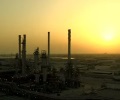Global oil refiners to deepen output cuts as virus destroys demand
Home /
Oil & Energy /
Oil & Companies News / Global oil refiners to deepen output cuts as virus destroys demand
Oil refiners from Texas to Thailand are bracing for deeper output cuts, bruised by an unprecedented demand shock as more countries lock down and restrict travel to contain the spread of the coronavirus.
In Asia, home to over a third of the global refining capacity, India’s top refiner has slashed output by up to 25%-30% while operators in Japan, South Korea and Thailand – already running at reduced rates – are looking at more cuts even as they shut plants for maintenance.
Several refineries in Europe and the United States have also cut output since last week.
China, which restarted its economy after weeks of lockdown, is an outlier with its refining sector showing signs of recovery amid a decline in the number of new virus cases.
Global oil demand, however, will likely slump 18.7 million barrels per day (bpd) in April, versus a 10.5 million bpd drop in March, Goldman Sachs analysts said. Total annual consumption will drop 4.25 million bpd from 2019 levels, they added.
“Such a collapse in demand will be an unprecedented shock for the global refining system,” the analysts said.
Asia accounts more than 60% of world oil demand growth.
The virus pandemic has roiled financial markets and oil has been hit particularly hard, crashing about 60% so far this year – on track for their biggest quarterly loss ever.
Refiners in Asia are now losing money as domestic demand has dried up with people staying at home and bleak margins making exports not lucrative either.
A complex refinery in Singapore stands to lose nearly $2 for every barrel of crude it processes, including losses of more than $6 a barrel on gasoline production, Reuters calculations show.
To make matters worse, some refiners have been unable to use the downtime for maintenance purposes due to manpower shortage amid virus-linked travel curbs.
“This first quarter would be the worst first quarter we have ever seen as producing oil products was loss-making,” said Cho Sang-bum, an official at the Korea Petroleum Association.
PROFIT WARNINGS
South Korea run rates fell to 82.8% in February, lowest for the month since 2014, and more cuts will come as gasoline and diesel demand are expected to fall 30% on year in March, sources and data from the Korea National Oil Corp show.
Japan too is mulling more cuts after run rates fell nearly 7% for the first 12 weeks in 2020, data from the Petroleum Association of Japan show.
Japan’s top refiner JXTG expects a record net loss of 300 billion yen (2.3 billion pounds) for the year ending March, while Hyundai Oilbank is planning to cut expenses by 70% to help offset the impact of the slump in margins.
In India, refiners are facing a tough cash flow situation, an official at one of the state refiners said.
Their tanks are full, but their retail income has virtually stopped due to weak demand while they continue to make payments for crude imports to avoid default, the official added.
In contrast, China, the world’s No. 2 refining centre, is expected to see its average run rate rise 3% on year to 77% in the second quarter, from 63% in February, said Seng Yick Tee, analyst at Beijing-based consultancy SIA Energy.
Mega refineries are optimising run rates for petrochemical feedstock, while low oil prices, stimulus measures and a rush to replenish stocks for manufactured parts as businesses come back online are spurring demand in China, the analyst added.
Australia’s four refiners said they were watching the situation and would adjust runs. Two of them warned local jet fuel demand was likely to collapse by up to 90% over the time that flight cancellations are in place.
Petron Corp and Shell in the Philippines, Indonesia’s Pertamina and PetroVietnam said their refineries were operating normally.
Source: Reuters (Reporting by Nidhi Verma in New Delhi, Jane Chung in Seoul, Yuka Obayashi in Tokyo, Chayut Setboonsarng in Bangkok, Enrico dela Cruz in Manila, Wilda Asmarini in Jakarta, Khanh Vu in Hanoi, Sonali Paul in Melbourne, Muyu Xu in Beijing, Shu Zhang, Jessica Jaganathan, Roslan Khasawneh, Chen Aizhu and Florence Tan in Singapore; Editing by Himani Sarkar)



